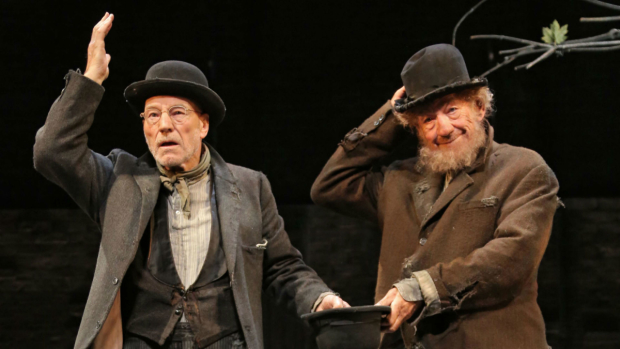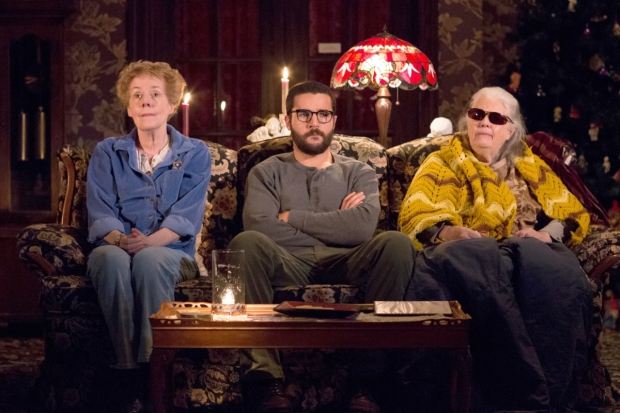Our Shrinking Repertoire (Part II)
New plays are fine (when they’re fine), but what about the great plays?
This is part II of Michael Feingold's latest "Thinking About Theater" column. Click here to read part I.

(© James Minchin III)
One problem that New York has always had with greatness is that our mainstream theater is a commercial theater, and what's great does not always make money: Sometimes, especially when it comes in a new form, the disruption it causes actively drives the pleasure-seeking, affluent crowds away. We've become habituated to Beckett's Waiting for Godot, today a classic taught in every college's Modern Drama course, and regularly revived with easily assembled all-star casts. It takes effort to recall that 60 years ago, when it premiered on Broadway, Godot was a complete puzzlement to most theatergoers. Even with two star names — Bert Lahr and E.G. Marshall — it had only a short run (60 performances) with a lackluster box-office. The producer's ad campaign included a plea for 100,000 intellectuals to fill the empty seats. They didn't come.
Today, three Broadway and half-a-dozen off-Broadway revivals later, we see Godot differently. Whether we understand it or not, it fits our received idea of what constitutes a great play. When it's well enough done, we feel its effect. Its images, lines, and characters — even some of its stage directions, like They do not move — have entered our language. And yet — one wonders how many of this city's regular theatergoers have experienced Godot. And one notes that Beckett's Endgame, a play nearly as great as Godot, has to this day never had a Broadway production. Possibly the image of aged parents stored in trash cans is still a little too unnerving for uptown ticket buyers.
We lose sight of greatness partly because so much of our theater is based on fashionable showiness, as well as on star names. Even an acknowledged masterpiece, in this way of thinking, needs to be pepped up with some kind of glitzy or fashionably "deconstructed" staging. One result of this has been New York producers' tendency to abdicate any responsibility for classics, preferring to transfer the burden onto London's shoulders. There, a more theatrically au courant public with a fondness for new approaches will applaud productions that often have little to do with the basic intent of a work, and the net effect for us is that Broadway honors the centennial of our own Arthur Miller with two productions imported from England, staged by a Belgian director of whose results Miller would almost certainly not have approved.

(© Joan Marcus)
This issue of authorial intentions is not a simple, clear-cut one. The theater Shakespeare worked in is so far away from ours in time and practice that I doubt he would understand much of what goes on in today's Shakespeare productions. (Most 19th-century productions might have left him even more flummoxed.) I can't guess what Thornton Wilder might have felt about David Cromer's production of Our Town, which turned several of Wilder's most cherished theatrical notions upside down. I only know that for me it restored meaning to an overfamiliar great play, and did so without hopelessly befuddling those new to the work.
Deceased authors, unless their estates play guardian, must take their chances. The main question for us is whether the directorial approach vitiates the work's power or re-energizes it; a secondary question is whether a director-centered production can give a new audience any sense at all of what the play contains. The work of Ivo van Hove, who seems to have become Britain's (and New York Theatre Workshop's) go-to director for classics, always leaves me feeling divided on this point. To a large extent, his directorial choices strike me as silly and arbitrary, but his habit of stripping away the conventional trappings of every script constitutes a kind of test of the play's strength. In his NYTW Hedda Gabler and his recent Broadway View From the Bridge, the drama withstood the assault, but his bathtub-based Streetcar was a draw at best, while The Little Foxes went down to defeat. We'll soon see how The Crucible holds up.
Ultimately, it seems frustrating that a director's approach to a play should be perceived in terms of a fight. Deconstruction may have its theoretical uses as an analytic tool, but in practice it chiefly tends to distract from the central goal. If you don't want to convey the substance of a play, why do it? (Van Hove's defenders would say he was trying to convey exactly that, raising a knottier question: To what extent are the realistic details part of Ibsen's or Miller's substance?)

(© Matthew Murphy)
And with foreign plays, hovering over the whole question of directorial interpretation is the issue of translation versus adaptation. "Versions" of plays are likely to contain passages far from the original, and employ approaches that would be inconceivable to its author. If you see an extremely terse play in contemporary prose, and are told that it's by Friedrich Schiller, you have every right to suspect that the management is putting one over on you. With the ancient Greek tragedies, where both language and stage conventions are remote from us, the problem reaches its height: Most contemporary productions either strip the story back to the bare myth, often nonverbally, like Andrei Serban's and Ariane Mnouchkine's, or essentially amount to a new play by the adapter. Aeschylus, Sophocles, and Euripides hardly get a word in.
As it happens, the not-so-great production of a great play that started me on this train of thought, back at the top of Part I, was an adaptation of a Greek tragedy, by a noted modern poet. He "made it his own," as they say, but he did not scant its greatness. It reminded me, as great plays remind both artists and audiences, that the bar for what we can achieve in the theater is set very, very high. And it made me recall — this is the happy ending — that we have plenty of artists at work today who can achieve greatness if we demand it. Ayad Akhtar's The Invisible Hand and Annie Baker's John are two recent instances. A facile tendency to think small and comfortable has taken over too much of our theatrical life. In today's dangerous world, the facile comforts — or even the facile discomforts of current aesthetic fashion — are not the wisest option.
Michael Feingold's next two-part "Thinking About Theater" column will appear on consecutive Fridays April 22 and 29.
Michael Feingold has twice won the George Jean Nathan Award for Dramatic Criticism, most recently in 2015 for his "Thinking About Theater" columns on TheaterMania, and has twice been a finalist for the Pulitzer Prize in Criticism. He serves as chairman of the Obie Awards and has also worked as a playwright, translator, and dramaturg.











